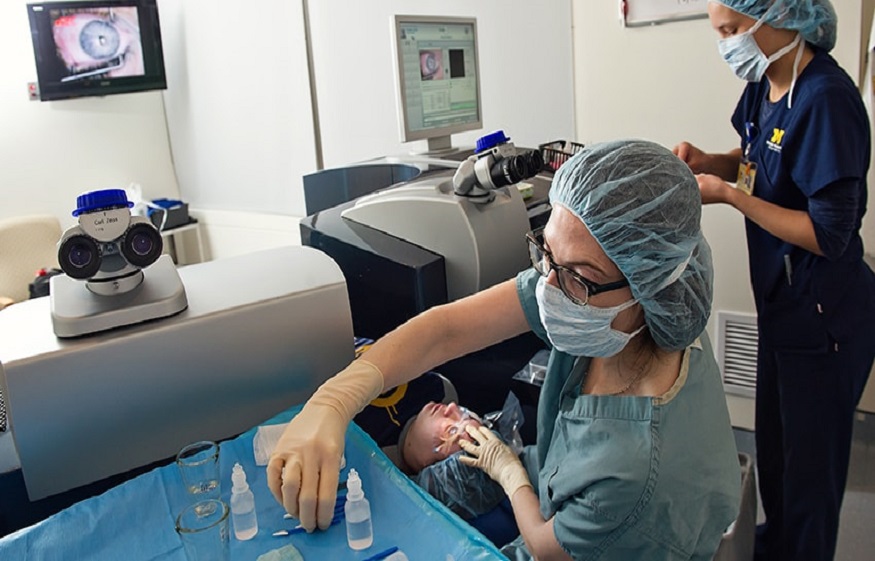Do you know about the LASIK eye surgery? It is common and famous as the best laser refractive surgery. You can ask your doctor to do this surgery instead of using contact lenses.
It is a good alternative to glasses. Doctors use a specific type of cutting laser in this surgery. They use this laser to change the shape of the cornea. It is a dome-shaped tissue that is present in front of your eye.
During the surgery, doctors precisely change the shape of the cornea to improve your vision. In normal eyes, the cornea works to refract light into the retina that is present at the back of your eye.
The light bents irregularly in conditions like astigmatism, nearsightedness, and farsightedness that causes blurred vision. Scleritis or sclera eye disease is the inflammation of the whitish area present in the eye. It is a serious disease of the eyes that is linked with various autoimmune disorders.
If you want to be protected from a permanent loss of vision then don’ leave this condition untreated. Everyone who has refractive surgeries or LASIK surgery expects excellent results.
Some people have to restore their vision after the surgery because they may be vulnerable to develop certain eye conditions like sclera eye disease. Luckily, the track record of LASIK is good. Keep in mind that no procedure provides you 100% results.
Scleral, hybrid contact lenses, Semi-Scleral, and Custom Gas Permeable sometimes improve your vision and provide you relief. Doctors recommend it if the surgical procedure that is called enhancement cannot be possible. The GP lens has sharper clarity.
It helps to recover the optical imperfections. Soft contacts and eyeglasses cannot properly address these imperfections. If you want to restore the problems of sharpest vision then choose the hybrid or contact lenses.
The results of LASIK surgery are associated with the healing of your cornea and the skills of the surgeon. Some people face starbursts, halos, and glare after the laser procedures around street lights and headlights. Sometimes LASIK and other procedures induce irregular astigmatism.
This irregular astigmatism causes distorted and blurred vision. These problems are tolerable for the people who have a vision that is less than perfect so they get mild symptoms and recover easily after the surgery.
Other people can suffer serious consequences after the surgery that include headache, eye strain, and hurdles in driving at the time of night. Complications of LASIK that destroy your vision are rare. But LASIK eye surgery has certain side effects.
These side effects include dry eyes and problems of vision that are temporary such as glare. You can recover from these issues after weeks or months. Only a few people face these issues for a longer time. Following are the specific risks of LASIK surgery.
Table of Contents
Dry Eyes
LASIK surgery reduces the production of tears. You may feel your eyes dry unusually for the six months after the surgery. Dry eyes also decrease the quality of your vision. The eye doctor recommends eye drops in case of dry eyes.
If you experience chronic dry eyes then eye doctors may operate you for another procedure in which they put specific plugs in tear ducts. These ducts help tears to remain moist and prevent draining.
Double Vision, Halos, And Glare
If you have undergone LASIK surgery then you may face problems in seeing at night. These problems last for days or weeks. You may have noticed that the sensitivity towards light, haloes, glare around the lights that are bright, and double vision increases after the surgery.
Under Corrections
If the laser removes the tissues present in your eyes that are very small then you may not get the clear vision you expected after the surgery. Corrections are frequent in nearsighted people. You may also need another LASIK to remove tissues from your eyes.
Overcorrections
The laser can also remove too many tissues from your eyes. It is easy to fix under corrections as compared to overcorrections.
Astigmatism
Uneven removal of tissue can cause astigmatism. If you have this condition then you may need additional surgery, contact lenses, or glasses to improve your vision.
Flap Problems
If doctors remove the flap from your eyes front then it can lead to various complications such as excessive tears and eye infections. The outermost layer of corneal tissue may also grow in an abnormal way underneath the flap when the process of healing initiates.

